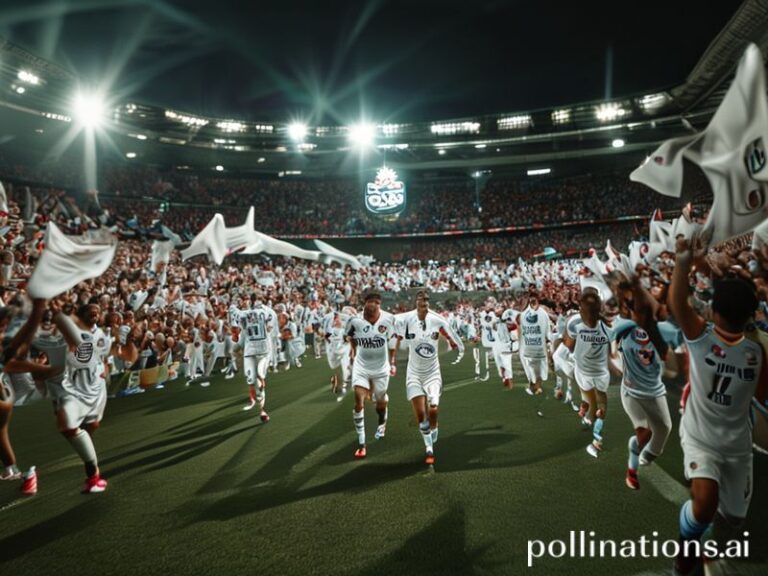Scotland Game: The Beautiful Losers Who Teach the World How to Fail in Style
Scotland Game: How a Nation Invented Modern Football, Then Decided Losing Was More Authentic
By Cormac O’Shaughnessy, International Affairs Correspondent
If you listen closely to the hum of global football chatter this week, you’ll hear a low, bagpipe-adjacent drone: Scotland is, once again, playing a game. Not just any game, mind you, but the Scotland Game—a ritual now exported, televised, and monetised from Baku to Bogotá. The fixtures rotate (Georgia away, Spain at Hampden, Norway when the fjords defrost), yet the emotional arc is as predictable as a Swiss train timetable: pre-match delusion, early promise, late collapse, existential after-party. The world tunes in for the same reason people rubber-neck motorway pile-ups: it’s awful, but at least it’s not happening to us.
To outsiders, the Scotland Game is a quaint sideshow. To insiders, it is a national MRI scan. Every misplaced pass is a referendum on identity, every dodgy penalty a judgment on centuries of imperial overreach. Other countries merely lose; Scotland loses with footnotes. When Steve Clarke’s men conceded twice in added time to Argentina at France ’98, Buenos Aires cheered; Glasgow filed the collapse under “post-colonial karma.” The global lesson was clear: if you once exported Presbyterian guilt and steam engines, don’t be shocked when it boomerangs back via a 25-yard free kick.
This week’s episode—Euro qualifying, Group A, matchday eight—carries the usual geopolitical baggage. Spain arrive unbeaten, slick as Iberian olive oil, flirting once again with the concept of “tiki-taka as soft power.” Georgia, meanwhile, have discovered that Eurovision points can be converted into FIFA rankings if you hum loud enough. Norway rock up with Erling Haaland, a Viking NFT in human form, ready to pillage whatever fragile confidence remains north of Berwick. Scotland? They’re busy debating whether a draw constitutes “moral victory” or merely “statistical cowardice.”
The broadcast rights tell the broader story. Qatari beIN Sports paid handsomely to beam the Scotland Game into Doha sports bars, where migrant workers watch on 15-minute delays between shifts. In Lagos, betting syndicates price the exact minute Scotland’s midfield will collectively remember gravity exists. Even Tokyo has skin in the game; Japanese whisky conglomerates sponsor the post-match “dram of disillusionment,” a marketing masterstroke that turns national despair into limited-edition barrel sales. Capitalism, bless its cold mechanical heart, has monetised melancholy and slapped tartan on it.
Why does the planet care? Because the Scotland Game is the only sporting event that doubles as a live-action seminar in the perils of expectations management. Emerging economies study it like a cautionary TED Talk: “Here’s what happens when you romanticise the past without investing in the present.” The IMF could replace half its country reports with 90-minute Scotland highlights; same fiscal bloodletting, better commentary.
Historians note that Scotland codified the rules of association football in 1867, then politely stepped aside so everyone else could become really good at it. This is the original sin baked into every fixture: the inventor forced to watch the students graduate summa cum laude while he resits Year Nine. Other nations treat football as war; Scotland treats it as group therapy with studs. The rest of us watch and think, “There but for the grace of competent coaching go we.”
And so, as the final whistle looms on another chilly Glasgow night, the global audience leans closer. Pundits in Rio de Janeiro rehearse their “plucky underdog” clichés. Crypto bros in Singapore hedge against a 3-0 collapse with NFTs of crying goalkeepers. In a Kyiv bomb shelter, a kid in a retro Scotland top clutches a radio, rooting for the underdog because he knows what it feels like when the world stops returning your calls.
The Scotland Game ends, inevitably, in heroic failure—a phrase the Oxford English Dictionary now lists under “Scottish, adj.” The players slump; commentators reach for synonyms of “gallant.” Somewhere, a lone piper plays a lament that sounds suspiciously like the Champions League theme in a minor key. And the planet changes channel, comforted by the knowledge that no matter how bad things get, at least we’re not Scottish football.
There’s a certain dark elegance to it all: a country that gave the world the beautiful game now specialises in the exquisite art of losing at it. In that sense, the Scotland Game isn’t just a match; it’s a public service—reminding humanity that progress is optional, but self-deprecation is eternal. Slàinte.







